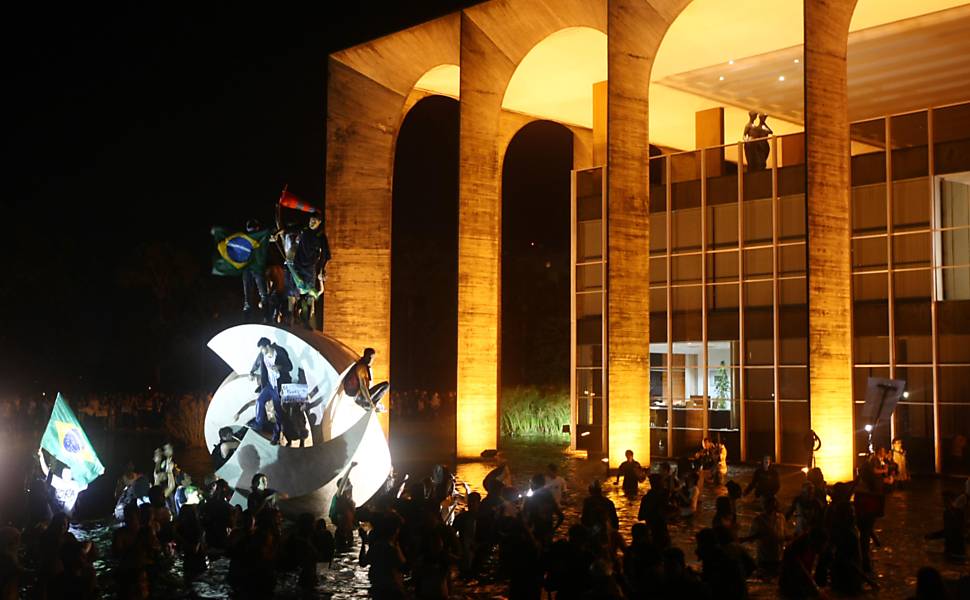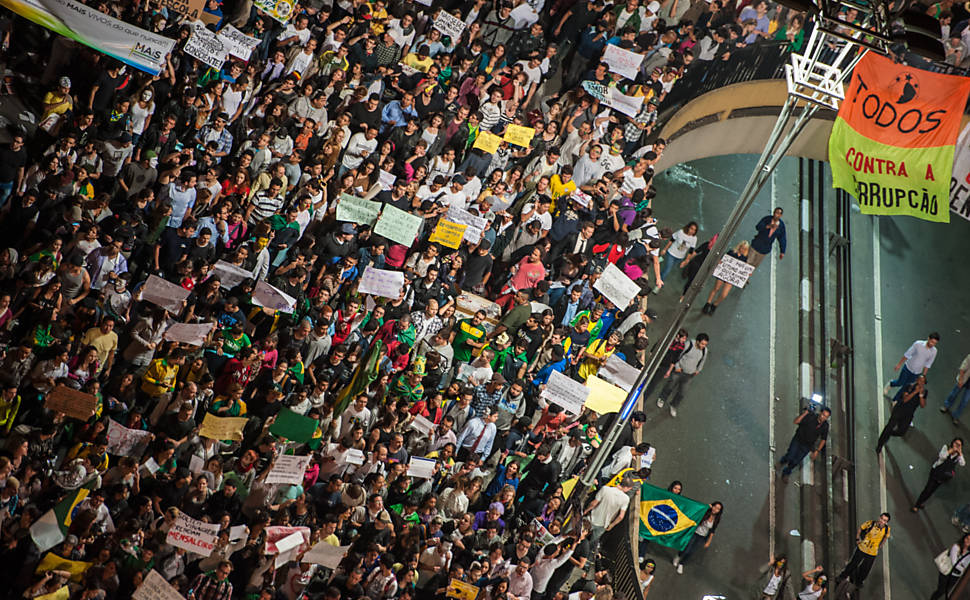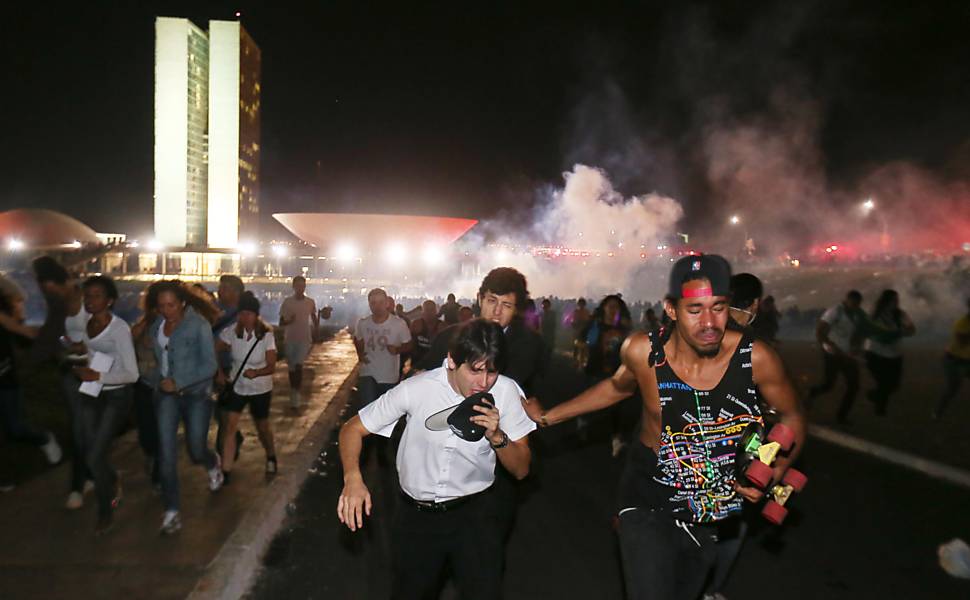The situation in Brazil has changed radically since I wrote this a week ago. Most obviously, the protests are much bigger, perhaps around 200 times bigger. Importantly, many of the 5,000 people I was on the street with last Thursday no longer have much do with what we’re seeing on the streets, and the original Movimento Passe Livre will not organize any more protests in the near future, saying they were alarmed by the direction some of the demonstrators have taken recently (See Claire Rigby’s piece, below). And two people are dead.
I believe it’s easier than before to explain where the protests came from, and more difficult to predict what they will mean. I want to shoot off some scattered thoughts, but they may presuppose a tiny bit of knowledge. So first, some background for those that need it.
Here are the five stories I’ve done for the LA Times in the last week. The most important is the first one, the big feature I did yesterday attempting to explain what is behind all of this.
Brazil protests tap into frustration of have-nots (June 20)
Protests continue as thousands rally in São Paulo (June 18)
Authorities in Brazil reduce bus fares in response to protests (June 18)
Tens of thousands protest conditions in Brazil (June 17)
Protests against São Paulo fare hike turn violent (June 13)
After these were written, over a million people took to the streets last night across the country. Though in many cases these were supposed to be victory celebrations after fares were reduced in São Paulo and Rio, clashes ensued, one protester was killed by a car, and on the other side of Brazil a middle-aged street cleaner died after she inhaled tear gas.
The cause –
Last week I said that this explosion was more the consequence of economic growth in the last decade than of a recent slide in growth or even inflation. Yes, 40 million people rose out of poverty into a new middle class, and people feel empowered now to make the demands for what they were implicitly promised, an advanced middle-class society with services to match. And yes, they justifiably have a lot to complain about, especially when it comes to the things the protests originally centered on. Public transportation is abhorrent and overpriced, public schools and hospitals are tragic, and the police often treat Brazilians like dangerous criminals rather than citizens. This reality contrasts all too clearly with the image the shiny World Cup stadiums want to sell the world.
But I think this week gave us another, complementary, way to interpret what has unfolded. The obviously brutal police reaction on June 13, combined with the spotlight the Confederations Cup and massive media support provided, gave a generation, for the first time, a stage on which they could voice their complaints. And not only could they voice their grievances with the state, they could do it in an atmosphere of (justified, probably) self-righteousness, euphoria, and historical importance. The obviously unjustified police crackdown last Thursday (and then at soccer games Saturday and Sunday) gave the sheen of legitimacy to every issue Brazilians had to bring to to the table, since they were also asserting the right to protest itself.
The main issues from the start were ones that, in my opinion, deserved the near-unanimous support of the Brazilian people – better transportation, education, healthcare, and police. But the direction things have taken recently has shown that this special kind of protest moment throws up lots of contradictions as well. If everyone is together demanding everything, including things that may contradict the other things, that’s not exactly politics. Last night’s clashes hinted at why things may fall apart, or at least take separate paths.
It was incredibly bizarre to see the mostly new protesters shouting down many of the people who had spearheaded the movement just last week, because they were representing the same groups they always had. It was almost as if, after 20 years without a mass-based protest movement, no one realized that if they didn’t like a march organized around one specific issue (transportation fees, in this case) they were free to organize their own around another issue at another time and another place. They didn’t need to invade someone else’s protest and try to change it.
That was the situation in São Paulo, at least. Keeping track of the rest of the cities across Brazil has been so difficult that it’s impossible to summarize here.
I don’t think the vandalism or violence really need explaining. If you have over a million people on the streets because they are angry about something, it only takes a tiny, tiny, minority for something to get out of hand. All reports still indicate the overwhelming majority of protesters are peaceful. Where I come from, all it takes is a basketball victory to start a riot.
Next step
So what’s the next issue for those that want to stay on the street? Some coming together on Saturday think it’s opposition to PEC 37, a very complicated constitutional amendment which puts criminal investigations in the hands of the police, while the power to accuse remains with the Public Ministry, which will not investigate directly but oversee investigations. Without boring you, I can say that after a fair amount of research I still don’t know if I support it or not, but I certainly can’t understand why it would be the next flag under which to unite the ‘people’ rather than something so obvious as healthcare, education, or the police. No one holding a ‘PEC 37’ sign in São Paulo last night could explain why to my satisfaction, either.
Then there is this quite shockingly juvenile video being passed around (the music!), which comes with the added bonus that I may now be hacked because I said so. The other of the video’s ‘five causes,’ which were all well-represented on the street last night, make sense to some extent, I guess, and focus largely on corruption prosecution, but it seems bizarre to me that a movement would have its goals defined by a masked man on a Youtube channel.
In São Paulo, people have been protesting Marco Feliciano for a while now. That may get a boost. Then there are the movements that have already been around forever, protesting the World Cup preparations and pushing for more concrete goals like better social investments.
It seems we have a generation that has re-discovered its right to complain to a government which should represent them, a dormant energy and a desire to make a difference. Yes, some of these kids look new to the politics game, and the learning curve may be steep.
But as to what will happen in the short and mid-term, I haven’t the slightest clue. Hopefully the energy can be sustained but poured into more focused, and perhaps segregated, causes in the case of inevitable disagreements. But we’re already seeing in-fighting and defections in the movement as it stands. And now we have a body count.
Politics
This is the billion-dollar question this afternoon. If you are Dilma, what do you do? Do you assume these movements may lose legitimacy and fracture, and hold back from giving into a group that doesn’t have specific demands anyways?
Or, perhaps the tougher question: If Dilma wanted to give the protesters exactly what they want, what would that even mean? What could she give? What could she do right now? After all of this, if it really is supported by the population, the country is likely to demand something to show for it. We’ll see when she speaks tonight at 9pm.
Note 1 – The media
The left, the Movimento Passe Livre, and even this MTV star, are saying that after initially calling for a police crackdown, the conservative media in Brazil (that’s basically all of it) are now trying to turn the protests into an empty anti-politics movement, which to them makes it anti-PT, useless, or worse. Though it sounds radical, I wouldn’t entirely discount this hypothesis.
Note 2 – Me
I may keep updating this as the situation unfolds. I may also change my mind on every single thing I’ve written here.




